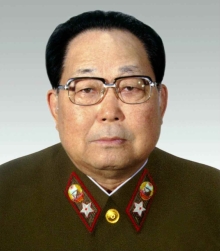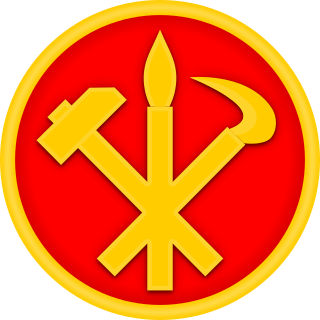Related Research Articles

Kim Yong-chun was a North Korean soldier and politician. He was a leader of the North Korean military. He held the North Korean military rank Chasu, was Vice Chairman of the National Defense Commission of North Korea, and was Minister of People's Armed Forces. He held a minor post within the Workers Party.

Jang Song-thaek was a North Korean politician. He was married to Kim Kyong-hui, the only daughter of North Korean premier Kim Il Sung and his first wife Kim Jong-suk, and only sister of North Korean general secretary Kim Jong Il. He was therefore the uncle of current leader of North Korea, Kim Jong Un.

The Ministry of State Security of the Democratic People's Republic of Korea is the secret police agency of North Korea. It is an autonomous agency of the North Korean government reporting directly to the Supreme Leader. In addition to its internal security duties, it is involved in the operation of North Korea's concentration camps and various other hidden activities. The agency is reputed to be one of the most brutal secret police forces in the world, and has been involved in numerous human rights abuses.

The Workers' Party of Korea (WPK) is the founding and sole ruling party of the Democratic People's Republic of Korea, commonly known as North Korea. Founded in 1949 from the merger of the Workers' Party of North Korea and the Workers' Party of South Korea, the WPK is the oldest active party in Korea. It also controls the Korean People's Army, North Korea's armed forces. The WPK is the largest party represented in the Supreme People's Assembly and coexists with two other legal parties making up the Democratic Front for the Reunification of Korea. However, these minor parties are completely subservient to the WPK and must accept the WPK's "leading role" as a condition of their existence. The WPK is banned in South Korea under the National Security Act and is sanctioned by the United Nations, the European Union, Australia, and the United States.

O Kuk-ryol was a North Korean military general. He was Chief of General Staff of the Korean People's Army from 1979 to 1988. He also served as vice-chairman of the National Defence Commission of North Korea, head of the Operations Department from April 2009 to June 2016. Foreign observers referred to O as the second most powerful man in North Korea.

Vice Marshal Ri Yong-ho was a North Korean military officer who was Chief of the General Staff of the Korean People's Army from 2009 to 2012, as well as a member of the Presidium of the Workers' Party of Korea from September 2010 to July 2012.

Kim Jong-gak is a Korean People's Army (KPA) official. He was a member of the Politburo of the Workers' Party of Korea (WPK). He served as Minister of Defence briefly in 2012, and Director of the General Political Bureau of the KPA in 2018.

The death of Kim Jong Il was reported by North Korean state television news on 19 December 2011. The presenter Ri Chun-hee announced that he had died on 17 December at 8:30 am of a massive heart attack while travelling by train to an area outside Pyongyang. Reportedly, he had received medical treatment for cardiac and cerebrovascular diseases, and during the trip, Kim was said to have had an "advanced acute myocardial infarction, complicated with a serious heart shock". However, it was reported in December 2012 by South Korean media that the heart attack had instead occurred in a fit of rage over construction faults in a crucial power plant project at Huichon in Chagang Province.

Choe Ryong-hae is a North Korean politician and military officer who currently serves as Chairman of the Standing Committee of the Supreme People's Assembly and First Vice President of the State Affairs Commission, holding both positions since April 2019. Due to holding the first office, he was considered the head of state of North Korea before the country's constitution was amended to transfer this position to the President of the State Affairs Commission, Kim Jong Un. He is also a member of the Presidium of the Politburo and Vice Chairman of the Workers' Party of Korea (WPK). He also served as Supreme Leader Kim Jong Un's military second-in-command, currently being third top-ranking official in North Korea after Kim Jong Un and premier Kim Tok-hun.

In North Korea, the Political Bureau of the Central Committee of the Workers' Party of Korea (WPK), or simply the Politburo, formerly the Political Committee (1946–61), is the highest decision-making body in the ruling party between sessions of its Central Committee. Article 25 of the Party Charter stipulates that "The Political Bureau of the Party Central Committee and its Standing Committee organize and direct all party work on behalf of the party Central Committee between plenary meetings. The Political Bureau of the Party Central Committee shall meet at least once every month." The Politburo is elected by the Central Committee of the Workers' Party of Korea.

The Secretariat of the Workers' Party of Korea, formerly known as the Executive Policy Bureau (2016–21), manages the work of the Politburo of the Workers' Party of Korea and its Presidium. The General Secretary leads the work of the Secretariat, and the body is composed of several members.
Kim Won-hong is a North Korean politician and military general.

Kim Yo-jong is a North Korean politician and diplomat serving as the Deputy Department Director of the Publicity and Information Department of the Workers' Party of Korea, or WPK. She also served as an alternate member of the Politburo of the Workers' Party of Korea from 2017 to 2019, and again from 2020 to 2021. Since September 2021, she has served as a member of State Affairs Commission of North Korea, the only woman on the panel.

Kim Chol-man was a North Korean politician and military official. He was a member of several important committees and organizations, including the 6th Central Military Commission, the 6th Politburo, and the Second Economic Committee. He was at the forefront of the North Korean munitions industry, the country's economic base. In old age Kim was no longer considered a major player in North Korean politics, having retired from most of his important posts.
The history of the Workers' Party of Korea (WPK) encompasses the period from 1949 onwards.

The Organization and Guidance Department (OGD), created in 1946, is a department of the Central Committee of the Workers' Party of Korea (WPK), the ruling party of North Korea. Its central responsibility is to implement the directives and teachings of the Suryeongs [Great Leaders], Kim Il Sung and Kim Jong Il. The department was initially a department within the WPK General Affairs Department, but eventually spun off and was established at the 3rd Plenary Session of the 2nd Central Committee as the Organization Committee.

Kim Yang-gon was a North Korean politician and a senior official of the ruling Workers' Party of Korea.
Ri Pyong-chol is a North Korean marshal and formerly a top advisor of supreme leader Kim Jong Un, who served as Vice Chairman of the Central Military Commission and a member of the Presidium of the Politburo of the Workers' Party of Korea. He is a relative of Kim's wife, Ri Sol-ju. He currently also serves as a director of a department of the Central Committee of the Workers' Party of Korea (WPK) and First Deputy Director of the WPK Organization and Guidance Department (OGD).
Jong Kyong-thaek is a North Korean politician. He served as the Minister of State Security from 2018 to 2022, a member of the Central Military Commission of the Workers' Party of Korea (WPK), an alternate member of the Politburo of the WPK, and a member of the State Affairs Commission of North Korea.
References
- ↑ Jung, Myung-jin. 당대표자회, 40년대 해방전후 차세대 기수 전면 등장. Tongilnews. September 29, 2010.
- ↑ "Top 4 N.Korean Military Officials Fall Victim to Shakeup". Chosun Ilbo. Nov 30, 2012. Retrieved 1 December 2012.
- ↑ U Tong-chuk. North Korea Leadership Watch.
- ↑ Former Minister of People’s Security Ju Sang Song Appeared at War Anniversary Events. North Korea Leadership Watch.